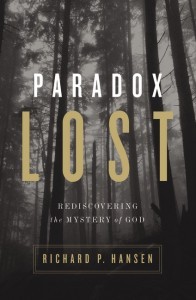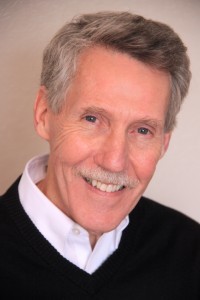Interview with Rich Hansen, author of Paradox Lost

 Paradox Lost on Amazon
Paradox Lost on AmazonI met Richard P. Hansen when I was giving a set of lectures on missional Christian community at First Presbyterian Church in Columbia Missouri where he was then pastor. I was really excited to hear about Paradox Lost, a book he was writing about paradox in the Christian faith — and now it is in print!
May 3 is the official release day. To celebrate the launch, I asked Rich if I could interview him about the project. Check it out, here, on his website, and on Amazon. (For a chance at a free copy, see below…)
Paradox Lost
GNH: Rich, congratulations on your new book! What’s the back story? What was the initial germ of the project?
RICH HANSEN: I first became fascinated by paradox about 30 years ago. In the 1990’s I wrote my Doctor of Ministry dissertation on how preaching biblical paradox helps Christians re-connect with the true God of the Bible, who is far more paradoxical and mysterious than often portrayed by the “fill in the blank” preaching style popular at the time. I then began writing journal articles about biblical paradox, which led eventually to the book.
GNH: Now that your book is all grown up and heading out into the world, what would you say is its mission? What do you want to happen in your readers’ lives?
RICH HANSEN: My passion is to engage with the growing number of people who want to wrestle with the paradoxes of life and faith rather than be handed pat answers or simplistic formulas. Thus, my primary audience is “thinking Christians”—believers who sense there is more still out there for them and want to keep exploring their faith. My secondary audience I would call “seekers”—folks interested in spiritual questions who may have been turned off by an anti-intellectual style of Christianity that did not take their doubts seriously.
GNH: For some readers, a book about paradox may sound too impractical or esoteric to interest them. How do you respond?
RICH HANSEN: For a sizable segment of American Christians, faith is about “practical answers to meet my felt needs”—i.e. God exists to solve my problems and make my life better. While God certainly does meet our needs, our most basic need according to Scripture is simply “that they know you, the only true God, and Jesus Christ, whom you have sent” (John 17:3 NIV). By wrestling with the paradoxes I write about, I hope my readers will come to know more deeply a God who is more awesomely mysterious than a consumer-oriented, problem-solving God.
GNH: When you encounter something paradoxical in your faith, how does it strike you emotionally? At first glance is it more problem or blessing?
RICH HANSEN: In the book, I say encountering paradox in our spiritual journey is like stopping to watch a street performer on a crowded sidewalk. He or she compels our attention: we stop and watch. Paradox in life and Scripture is intriguing to me in the same way: it draws me in, partly because I cannot explain or solve it. It’s like the piece of scotch tape stuck to your finger you keep shaking it to remove, but never can.
GNH: What would be an example of a paradox that has strengthened your faith or pushed you to grow as a Christian?
RICH HANSEN: Two that have helped me immensely are the paradox of the Trinity (God is Three, yet One) and the paradox of the Incarnation (Jesus is 100% human, yet 100% God). Both have forced me to not settle for easy, simplistic answers in my faith. Both, oddly enough, have immense practical value for daily living once we stop trying to “solve” them and instead look through them. This drive to use biblical paradoxes as windows through which we see God more deeply and truly is the theme of the book.
GNH: Is there more than one kind of paradox?
RICH HANSEN: Paradox exists in the tension created by two seemingly opposite ideas. A distinctive feature of my book is that I identify three different genres or “orders” of biblical paradox. Each order has a unique tension between its opposing ideas. For example, one is like the tension in a tuning fork: two individual tines must vibrate in tension with one another to produce the note. Much of the book explores biblical examples of these three kinds of tension.
GNH: Are some paradoxes good and some not so good?
RICH HANSEN: I discovered in my research that psychology uses paradox as a therapeutic tool in both behavioral modification and family systems theory. Paradox leads to health when it prods us to action or we learn to live within the tensions it creates. However, paradox can also create emotionally unhealthy “double binds” which can lead to neurosis or other problems. In the book I discuss the differences between healthy and unhealthy paradox.
GNH: We’ve been talking about paradox in Scripture. But do you also address paradox outside the Bible?
RICH HANSEN: Absolutely! I work hard using biblical paradox to shine a spotlight on all the paradoxical tensions everyone constantly lives within every day. Indeed, I think ordinary life is quite paradoxical today on any number of fronts. For example, America is tragically polarized today precisely because we have lost the paradox the ancient Greeks knew well—truth often exists in the tension between opposite extremes. To live successfully in the 21st century, we will all need to become more comfortable living within paradox.
GNH: I know you’ve been a pastor in America and a theology professor in Ethiopia. Do Christians in the two cultures find different things paradoxical?
RICH HANSEN: As children of the Enlightenment, reason is king in the American worldview. We expect to understand everything in the Bible and have it all make sense; if it doesn’t, we often assume it’s the Bible’s fault, not our faulty thinking. In Ethiopia, on the other hand, tradition is king. Most Ethiopians rarely question received tradition—including the Bible—which means intellectual paradoxes may not be as quickly recognized or as troubling to them.
GNH: What was one surprising story on the road to publication?
RICH HANSEN: While I was teaching theology in Ethiopia, Dr. John Walton from Wheaton College came as a guest lecturer. As we became acquainted, I ventured to ask Dr. Walton if he’d offer some feedback on my book proposal. Unknown to me, he instead took the initiative to send the proposal to both Zondervan and Intervarsity Press. Where before my contacts with publishers (including Zondervan) had been fruitless, this time I had a signed contract in a couple months! It is a great example to me that God can indeed do the impossible!
Any advice for pastors out there (and others) who think they have a book inside them?
I would say, “keep going and trust God.” I gave up several times and put the book on the shelf, only to take it down and work on it again, sometimes years later. As the story above indicates, God’s timing is perfect. Perhaps it’s the Calvinist in me, but I believe if I keep knocking, if God wills it the door will be opened.
Thanks Rich! All blessings on you as your book launches May 3rd.
————
 Richard Hansen has been a pastor in the PC(USA) for thirty years, and has taught theology at the Ethiopian Graduate School of Theology in Addis Ababa (2010-14), and as an adjunct professor at Mennonite-Brethren Biblical Seminary, Fresno, California. Connect with him online at his website, rich-hansen.com.
Richard Hansen has been a pastor in the PC(USA) for thirty years, and has taught theology at the Ethiopian Graduate School of Theology in Addis Ababa (2010-14), and as an adjunct professor at Mennonite-Brethren Biblical Seminary, Fresno, California. Connect with him online at his website, rich-hansen.com.
————
You can get a copy of Paradox Lost on Amazon by clicking here.
I’m giving away one free copy of Paradox Lost! Leave a comment below to enter. On 5/10/16 I’ll randomly choose one name from those who leave a comment.
(This post contains affiliate links.)
The post Interview with Rich Hansen, author of Paradox Lost appeared first on Gary Neal Hansen.



